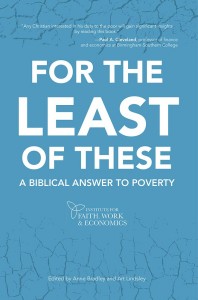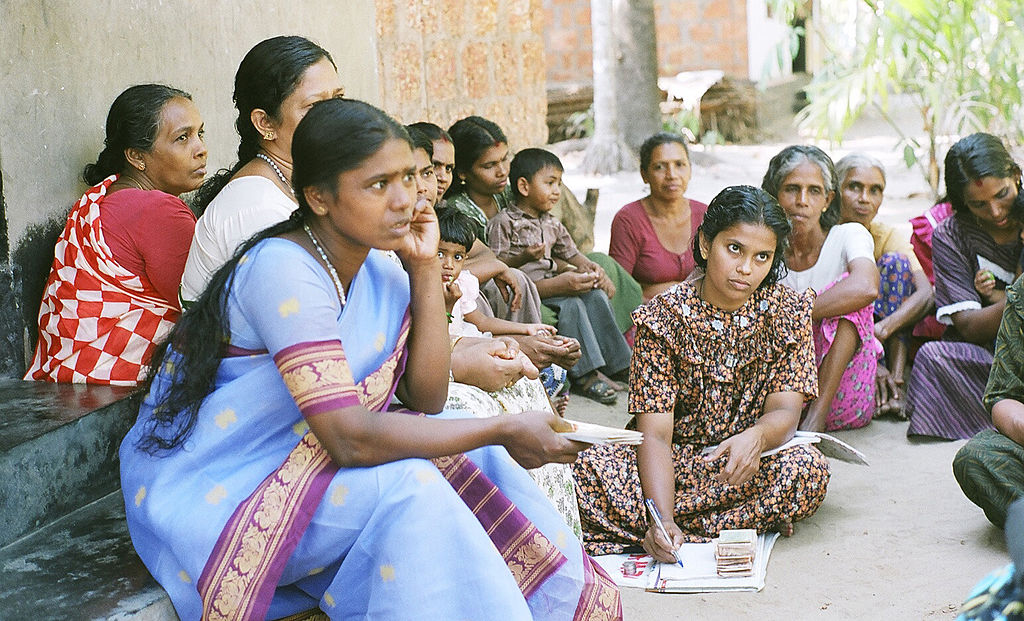EspañolThe notion that Jesus of Nazareth would have been a proponent of socialism is completely debunked in just the first few chapters of For the Least of These: A Biblical Answer to Poverty. Instead, this collection of essays offers an approach to eradicating poverty that is based on the most fundamental principles of Christianity.

The problem of poverty invokes many pressing questions for individuals: How much should we do to help those in need? What role should religious and nonprofit organizations play? How about the private sector and government? The Bible has answers, and they are based on individual free will and the fulfillment of the second great Christian commandment: love thy neighbor.
Despite 12 different authors, the book’s biblical underpinnings present a common theme: willingness to help and basic human dignity are the minimal conditions necessary to ensure that an individual can rise out of poverty. Willingness ensures that those offering help are sincere in their intentions, and it encourages the development of a positive social environment, leaving no room for coercion. The preservation of dignity allows the individual receiving help to prosper both economically and spiritually, without being subjected to a cycle of dependence.
The book’s editors, Anne Bradley and Art Lindsley — both vice presidents of the Institute for Faith, Work, and Economics (IFWE) — say that rather than wishing for the survival of our fellow man, our duty is to help him flourish in all areas of his life: “This is the reason why the best way to alleviate poverty over the long-term is not giving people money, but offering them opportunities through the market, so they can become self-sufficient.”
All the authors maintain that work and free enterprise have demonstrated their ability to bring millions of people out of poverty throughout the 20th century.
The Bible Favors Wealth and Prosperity
This book dispels a number of myths that ideological movements have conjured up in relation to the Bible, as they search for supreme approval.
Chapter 1, written by Glenn Sunshine, says that discussions of poverty and wealth in the Bible are often misguided. Despite the fact that the poor are viewed as blessed in Mark 10 — and that it is easier for a camel to pass through the eye of a needle, than for a rich man to get into heaven — Sunshine states that a closer look at the scripture reveals the true message.
The Bible is not opposed to the production of wealth. Rather, the Bible promises prosperity to those who follow its teachings, and it does not view the economy as a zero-sum game where wealth must arise via exploitation. Rather, Sunshine says it is the duty of the more fortunate to provide work to those who need it, just as dignity must be an inherent part of any kind of assistance that is offered to those in need (Deuteronomy 24:10).
In Chapter 4, Art Lindsley casts aside the fallacy that apostles and churches have set the example that we must live a communal life. In particular, he dismantles the superficial interpretation of Acts 2-5 that argues that the first church of Christ was essentially socialist, because its members “held all things in common” and shared all their possessions following Christ’s ascension.
Lindsley performs a contextual reading, demonstrating that these original Christians relied on the market to build their first church: they voluntarily sold their property and helped those in need. In fact, they valued and respected the concept of private property.
Does God Need the State to Redistribute Wealth?
In the book’s preface, Arthur C. Brooks summarizes the state’s role as an administrator of individual incomes through taxes: “the concept of will is removed from the equation, and without will, virtue is empty.”
“Never has there been a system that has done more for the people that Jesus called ‘the less [fortunate],’ than capitalism and free enterprise… Over the past 40 years, 80 percent of the worst global poverty — which is defined by the number of people that live on less than $1 per day — has been eliminated,” and this is not due to the help of the IMF or the World Bank. Brooks explains, “this is because rich countries have lowered their trade barriers, and because countries like China and India, who were once committed to socialism, have embraced — albeit tentatively and imperfectly — the markets and trade.”
The book does use several biblical references to highlight the need for a state to protect negative freedom. For example, Romans 13:3 says only those that have done wrong should fear the government, but it says nothing about the government being responsible for providing goods or services.
Sunshine emphasizes the revolutionary role played by Jesus Christ, who dared to separate Church from state. He uses the famous line from Matthew 22:21: “Render therefore unto Caesar the things that are Caesar’s; and unto God the things that are God’s.”
Sunshine not only believes this is revolutionary — Christians earned 300 years of persecution for this rebelliousness — but also profound: the relationship between God and man is an individual one, and should not depend on the state. This is the same private domain from which love for thy neighbor emerges.
Brian Griffiths and Dato Kim Tan expand this concept in Chapter 7. Their argument is based on the idea that international aid and charitable assistance has failed, and that poverty — an offense to God’s creation — represents a loss of infinite dignity and human potential.
They cite the fact that toward the end of the 1990s, foreign aid to Africa grew from 5 percent to 17 percent of the continent’s GDP, yet during this time Africa moved from a growth rate of 2 percent into a recession. Griffiths and Tan say this can be explained by the informal economy. Roughly 47 percent of economic activity in low income countries takes place in the informal economy, while small and medium sized businesses make up only 16 percent.
This phenomenon drastically limits tax revenue, forcing the state to depend on foreign aid. Therefore, the continuation of programs that promote informality (like some micro-finance initiatives), they contend, actually limit the potential for economic improvement.

The Importance of Individual Will
Biblical scripture says that God will judge his children based on their individual decisions and actions. The title of the book comes directly from Matthew 25, which summarizes the conclusions drawn by all the book’s essays. Jesus says, “whatever you did for the least of these brothers and sisters of mine, you did for me,” and for this, you will be judged.
David Kotter, author of Chapter 3, says that all good deeds must be done voluntarily, and not out of obligation. He cites 2 Corinthians 9:7: “Each of you should give what you have decided in your heart to give, not reluctantly or under compulsion, for God loves a cheerful giver.”
The spiritual renewal that is brought about by a connection with God allows human beings to be helped by this same God. “Jesus called on the poor to focus on their spiritual reality, which was more important than the suffering and deprivation of the world,” Kotter writes, in reference to Luke 12:30-32.
Kotter concludes by saying, “The Gospel fundamentally changes the hearts of believers. The advance of the gospel should reduce the type of oppression that makes some rich and others poor. It should also change attitudes regarding work, which will create more wealth, more independent people, and abundance that we can all share in.”
All of these responsibilities that come with Christian beliefs are, in essence, individual. The Word is directed at the individual because salvation, and a relationship with God, are inherently personal. After reading this book, or objectively examining the Bible, one can conclude that listening to God could do a lot of good for our economy.
 Versión Español
Versión Español












